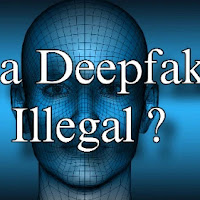Is a Deepfake Illegal? Understanding the Legal Boundaries of Synthetic Media

Introduction
In an age where artificial intelligence is revolutionizing almost every aspect of our lives, deepfake technology has emerged as one of the most controversial innovations. From Hollywood-style face swaps to deceptive political videos, deepfakes have the potential to entertain, deceive, and even defraud. But the biggest question remains: Is a deepfake illegal?
This article dives deep into the legality of deepfakes, examining how different countries view the technology, what laws currently exist, and what it means for individuals, creators, and victims.
What is a Deepfake?
A deepfake is a type of synthetic media created using artificial intelligence and machine learning algorithms, primarily deep learning. This technology can manipulate video or audio recordings to make it appear as if someone has said or done something they never did.
While some deepfakes are harmless or used for satire and entertainment, others are created for malicious purposes like spreading misinformation, defamation, or fraud.
Is Deepfake Illegal? The Short Answer
Deepfakes themselves are not inherently illegal. The legality depends on the intent, content, and context in which they are used. For instance:
- Creating a parody or for educational purposes may be protected under free speech laws.
- Using deepfakes for fraud, impersonation, or to damage someone’s reputation could be criminal or civilly liable.
Legal Status of Deepfakes Around the World
United States
The U.S. does not have a federal law that directly bans all deepfakes. However, some state laws and existing regulations apply in specific scenarios:
- Texas prohibits deepfakes intended to influence elections.
- California restricts deepfake porn and political deepfakes within 60 days of an election.
- Defamation, identity theft, and harassment laws may also apply.
United Kingdom
The UK is considering laws to criminalize the non-consensual sharing of deepfake pornography under the Online Safety Bill. Existing laws on harassment, privacy, and intellectual property also apply.
European Union
The EU has proposed the AI Act, which categorizes deepfakes as high-risk content. Disclosure requirements and penalties are expected for non-compliance.
India
India has no specific deepfake law, but such content could be punishable under:
- Section 66D of the IT Act (identity theft),
- Section 500 of the IPC (defamation), and
- Section 67 (publishing obscene material).
When Do Deepfakes Become Illegal?
Deepfakes become illegal when they:
- Violate Privacy: Creating intimate or personal content without consent.
- Cause Defamation: False representation damaging someone’s reputation.
- Lead to Financial Fraud: Using AI-generated voices to scam or impersonate.
- Interfere with Democracy: Altering political speeches or spreading fake news.
- Facilitate Cybercrime: Phishing using deepfake videos or audio.
Real-Life Examples of Illegal Deepfakes
- Fake CEO Scam – In 2019, fraudsters used deepfake voice technology to impersonate a CEO and trick an employee into transferring $243,000.
- Deepfake Pornography – Several celebrities have been victims of explicit deepfakes, leading to lawsuits and criminal investigations.
- Political Misinformation – Deepfakes have been used to spread false speeches and influence public opinion during elections.
Challenges in Regulating Deepfakes
- Rapid Tech Evolution: Laws struggle to keep up with technological advancement.
- Jurisdiction Issues: Deepfakes can be created and distributed globally.
- Free Speech vs. Harm: Balancing innovation with protection of rights.
- Detection Difficulties: High-quality deepfakes are hard to identify.
How to Protect Yourself from Deepfakes
- Be Skeptical of Viral Videos: Especially those that seem out of character.
- Verify with Trusted Sources: Don’t rely solely on social media.
- Use Deepfake Detection Tools: Tools like Deepware Scanner or Microsoft's Video Authenticator.
- Educate Others: Spread awareness in your community.
FAQs
Q1. Is it illegal to create deepfakes for fun or parody?
Not necessarily. If the content is clearly satirical and doesn’t harm anyone, it may fall under free speech or fair use laws.
Q2. What should I do if someone creates a deepfake of me?
You can file a police complaint under cybercrime laws. It’s also advisable to consult a lawyer for civil remedies like defamation suits.
Q3. Are there any tools to detect deepfakes?
Yes. Tools like Deepware Scanner, Microsoft's Video Authenticator, and Sensity.ai can help identify manipulated media.
Q4. Can deepfakes be used legally in movies or advertisements?
Yes, with the proper consent and rights clearance, deepfakes can be legally used in entertainment and advertising.
Conclusion
So, is a deepfake illegal? The answer is not black and white. While the technology itself isn’t illegal, the way it's used can definitely cross legal and ethical lines. As deepfake technology becomes more advanced, it’s crucial for laws to evolve and for individuals to remain vigilant.
Whether you're a content creator, consumer, or someone concerned about privacy, understanding the legal implications of deepfakes is the first step in navigating this powerful but potentially dangerous tool.

